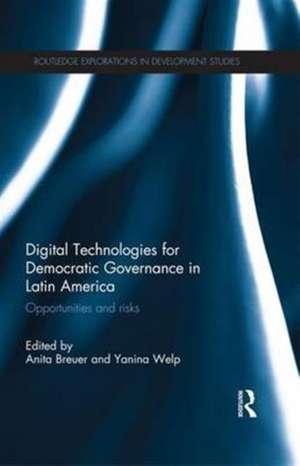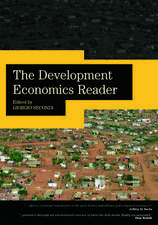Digital Technologies for Democratic Governance in Latin America: Opportunities and Risks: Routledge Explorations in Development Studies
Editat de Anita Breuer, Yanina Welpen Limba Engleză Paperback – 24 apr 2016
Specifically, the book examines if and how far the spread and use of new ICT affected central aims of democratic governance such as reducing socio-economic and gender inequality; strengthening citizen participation in political decision making; increasing the transparency of legislative processes; improving administrative processes; providing free access to government data and information; and expanding independent spaces of citizen communication. The country case and cross-country explore a range of bottom-up driven initiatives to reinforce democracy in the region.
The book offers researchers and students an interdisciplinary approach to these issues by linking it to established theories of media and politics, political communication, political participation, and governance. Giving voice to researchers native to the region and with direct experience of the region, it uniquely brings together contributions from political scientists, researchers in communication studies and area studies specialists who have a solid record in political activism and international development co-operation.
| Toate formatele și edițiile | Preț | Express |
|---|---|---|
| Paperback (1) | 190.88 lei 6-8 săpt. | |
| Taylor & Francis – 24 apr 2016 | 190.88 lei 6-8 săpt. | |
| Hardback (1) | 544.50 lei 6-8 săpt. | |
| Taylor & Francis – 9 ian 2014 | 544.50 lei 6-8 săpt. |
Din seria Routledge Explorations in Development Studies
- 8%
 Preț: 389.80 lei
Preț: 389.80 lei -
 Preț: 310.45 lei
Preț: 310.45 lei -
 Preț: 325.72 lei
Preț: 325.72 lei -
 Preț: 325.72 lei
Preț: 325.72 lei -
 Preț: 152.57 lei
Preț: 152.57 lei -
 Preț: 155.44 lei
Preț: 155.44 lei -
 Preț: 311.41 lei
Preț: 311.41 lei - 8%
 Preț: 388.92 lei
Preț: 388.92 lei -
 Preț: 326.96 lei
Preț: 326.96 lei -
 Preț: 311.41 lei
Preț: 311.41 lei -
 Preț: 281.90 lei
Preț: 281.90 lei -
 Preț: 324.67 lei
Preț: 324.67 lei -
 Preț: 489.26 lei
Preț: 489.26 lei -
 Preț: 482.74 lei
Preț: 482.74 lei -
 Preț: 416.22 lei
Preț: 416.22 lei -
 Preț: 389.38 lei
Preț: 389.38 lei - 28%
 Preț: 821.06 lei
Preț: 821.06 lei -
 Preț: 389.38 lei
Preț: 389.38 lei - 18%
 Preț: 1000.27 lei
Preț: 1000.27 lei - 18%
 Preț: 998.71 lei
Preț: 998.71 lei - 26%
 Preț: 848.96 lei
Preț: 848.96 lei - 18%
 Preț: 1000.27 lei
Preț: 1000.27 lei - 18%
 Preț: 999.61 lei
Preț: 999.61 lei - 16%
 Preț: 299.87 lei
Preț: 299.87 lei -
 Preț: 299.52 lei
Preț: 299.52 lei -
 Preț: 411.42 lei
Preț: 411.42 lei - 14%
 Preț: 297.99 lei
Preț: 297.99 lei - 18%
 Preț: 1057.05 lei
Preț: 1057.05 lei - 18%
 Preț: 1060.25 lei
Preț: 1060.25 lei - 18%
 Preț: 1170.84 lei
Preț: 1170.84 lei - 18%
 Preț: 1000.27 lei
Preț: 1000.27 lei - 25%
 Preț: 544.50 lei
Preț: 544.50 lei - 31%
 Preț: 765.01 lei
Preț: 765.01 lei - 28%
 Preț: 851.46 lei
Preț: 851.46 lei - 18%
 Preț: 1000.27 lei
Preț: 1000.27 lei - 25%
 Preț: 767.38 lei
Preț: 767.38 lei - 31%
 Preț: 763.78 lei
Preț: 763.78 lei - 14%
 Preț: 301.33 lei
Preț: 301.33 lei - 18%
 Preț: 1110.74 lei
Preț: 1110.74 lei -
 Preț: 485.07 lei
Preț: 485.07 lei
Preț: 190.88 lei
Preț vechi: 334.03 lei
-43% Nou
Puncte Express: 286
Preț estimativ în valută:
36.53€ • 37.100$ • 30.16£
36.53€ • 37.100$ • 30.16£
Carte tipărită la comandă
Livrare economică 15-29 aprilie
Preluare comenzi: 021 569.72.76
Specificații
ISBN-13: 9781138686793
ISBN-10: 1138686794
Pagini: 248
Dimensiuni: 156 x 234 mm
Greutate: 0.45 kg
Ediția:1
Editura: Taylor & Francis
Colecția Routledge
Seria Routledge Explorations in Development Studies
Locul publicării:Oxford, United Kingdom
ISBN-10: 1138686794
Pagini: 248
Dimensiuni: 156 x 234 mm
Greutate: 0.45 kg
Ediția:1
Editura: Taylor & Francis
Colecția Routledge
Seria Routledge Explorations in Development Studies
Locul publicării:Oxford, United Kingdom
Public țintă
PostgraduateCuprins
1. Digital Trends in Latin American Politics (1990-2012) 2. A Latin Spring? Examining Digital Diffusion and Youth Bulges in Forecasting Political Change in Latin America 3. A Digital Sublime or Divide? The Impact of Information Communication Technology on the Poor in Latin America. 4. Designing Open Data Policies in Latin America 5. Some Notes on the Experiences with the Use of Technology and Electronic Voting in Latin America 6. South American Politics in the Information Age. A Study of Political Parties and MPs on the Net in Argentina, Paraguay and Uruguay 7. Crafting a new parliamentary dialogue sphere? The web and political communication in the current Venezuelan National Assembly 8. Social movements, democratic participation and ICTs 9. Social Change and Social Media: Incorporating Social Networking Sites into Activism in Latin America 10. Slacktivism or Efficiency-Increased Activism? Online Political Participation and the Brazilian Ficha Limpa Anti-Corruption Campaign 11. Social Media and Diaspora Activism: Participating in the Argentine Elections 2011 from Abroad 12. Claiming Citizenship: Web-based voice and digital media in socialist Cuba 13. Re-assessing ICT for democratic governance in Latin America (Editors’ conclusions)
Descriere
This book is the first to comprehensively analyse the political and societal impacts of new Information and Communication Technologies (ICT) in a region of the Global South. It evaluates under what conditions some Latin American governments and people have succeeded in taking up the opportunities related to the spread of ICTs, while others are confronted with the pessimist scenario of increased, digitally induced social and democratic cleavages.















